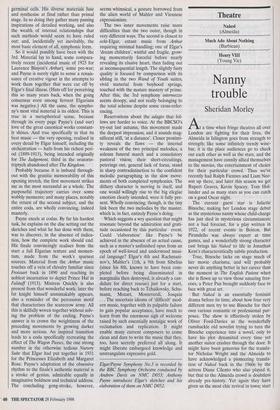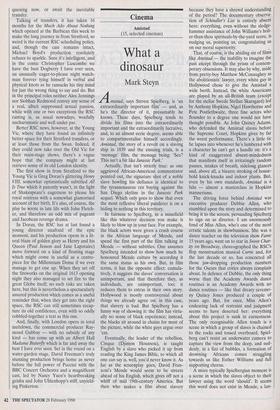Theatre
Naked (Almeida) Much Ado About Nothing (Barbican) Henry VIII (Young Vic)
Nanny trouble
Sheridan Morley
At a time when fringe theatres all over London are fighting for their lives, the Almeida in Islington goes from strength to strength; like some infinitely trendy wine- bar, it is the place audiences go to check out each other as well as the stars, and the management have cannily allied themselves to the movies, the entertainment of choice for their particular crowd. Thus we've recently had Ralph Fiennes and Liam Nee- son up there, and later this season we get Rupert Graves, Kevin Spacey, Tom Hol- lander and as many stars as you can catch on a good Oscar night.
The current guest star is Juliette Binoche, making her London stage debut as the mysterious nanny whose child-charge has just died in mysterious circumstances; not a bad forecast, for a play written in 1922, of recent events in Bdston. But Pirandello was always expert at time games, and a wonderfully strong character cast brings his Naked to life in Jonathan Kent's characteristically subtle production.
True, Binoche lacks on stage much of her movie charisma, and will probably never do anything better in her career than the moment in The English Patient when she is flown up to view those amazing fres- coes, a Peter Pan brought suddenly face to face with great art.
But Naked is an essentially feminist drama before its time, about how four very different men try to use Binoche for their own various romantic or professional pur- poses. The show is effectively stolen by Oliver Ford-Davies as the wonderfully ramshackle old novelist trying to turn the Binoche experience into a novel, only to have his plot dynamited every time yet another suitor crashes through the door. It might have been generous for the transla- tor Nicholas Wright and the Almeida to have acknowledged a pioneering transla- tion of Naked back in the 1960s by the actress Diane Cilento who also played it, but that to the Almeida crowd is doubtless already pre-history. Yet again they have given us the most chic revival in town; start queuing now, or await the inevitable transfer.
Talking of transfers, it has taken 16 months for the Much Ado About Nothing which opened at the Barbican this week to make the long journey in from Stratford, so weird is the current RSC scheduling policy, and, though the cast remains intact, Michael Boyd's production resolutely refuses to sparkle. Sure it's intelligent, and in the comic Christopher Luscombe we have the best Dogberry I have ever seen, an unusually eager-to-please night watch- man forever tying himself in verbal and physical knots as he ransacks his tiny mind for just the wrong thing to say and do. But in the principal roles neither Alex Jennings nor Siobhan Redmond convey any sense of a real, albeit suppressed sexual passion, while with one or two exceptions the RSC casting is, as usual nowadays, woefully uncharismatic and well under par.
Better RSC news, however, at the Young Vic, where they have found an infinitely better space for their Stratford transfers, or at least those from the Swan. Indeed, if they could now take over the Old Vic for their main-stage shows, there's a vague hope that the company might at last retrieve some of its old London identity.
The first show in from Stratford to the Young Vic is Greg Doran's glittering Henry VIII, somewhat optimistically subtitled All Is True which it patently wasn't, in the light of Shakespeare's eagerness to please his royal mistress with a somewhat glamorised account of her birth. It's also, of course, the play he wrote in late life with John Fletch- er, and therefore an odd mix of pageant and Jacobean revenge drama.
In Doran, the RSC has at last found a young director unafraid of the epic moment, and his production opens in a lit- eral blaze of golden glory as Henry and his Queen (Paul Jesson and Jane Lapotaire) move forward on a kind of floating stage which might come in useful as a centre- piece for the Millennium Dome if we ever manage to get one up. When they set off the fireworks on the original 1613 opening night they also managed to set fire to the great Globe itself; no such risks are taken here, but this is nevertheless a spectacularly assured production which comes as a useful reminder that, when they get into the right space, the RSC can still sometimes recap- ture its old confidence, even with so oddly cobbled-together a text as this one.
And, finally, with London opera in total meltdown, the commercial producer Ray- mond Gubbay — with no subsidy of any kind — has come up with an Albert Hall Madame Butterfly which is far and away the best I have ever seen. Set in the round on a water-garden stage, David Freeman's truly stunning production brings home as never before the full power of Puccini with the BBC Concert Orchestra and a magnificent cast, led by Nancy Yuen's heartbreaking geisha and John Uhlenhopp's stiff, unyield- ing Pinkerton.



























































 Previous page
Previous page